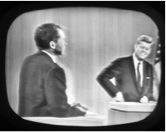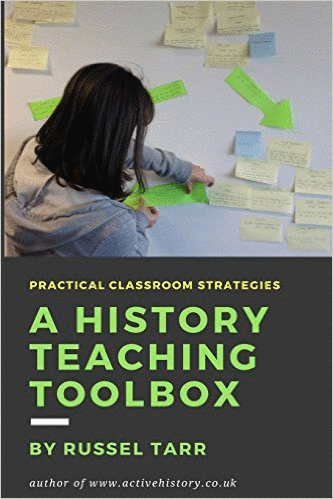JFK: Introduction and Overview
Students are provided with a teacher-led lecture based around the following image and make notes in this worksheet.
If you wish to set this as a homework task instead of lecture, you can use this interactive version of the image at Classtools and this accompanying video clip for additional notes.
The 1960 Election Campaign: The TV Debates and the Inaugural Address
The TV Debates:
In election year 1960, Senator John F. Kennedy and Vice President Richard Nixon took part in the first televised presidential debate, hosted by legendary newsman Walter Cronkite. This was the beginning of modern media-driven politics: JFK came across as suave, confident and handsome in front of the camera, whereas Nixon came across as tired, awkward and dishevelled. Kennedy had rested before the debates, and taken care to wear a bold, dark suit. In contrast, Nixon was exhausted from a strenuous campaign which had taken him across all 50 states, refused to use make-up, and sweated profusely. Television audiences therefore felt that Kennedy won the debate, while radio audiences felt the reverse"
Read through the opening question from Walter Cronkite, then read Nixon's response. Your teacher will clarify any of the points made which require context.
Next, discuss what you think Kennedy's response to Nixon's reply should be.
Finally, watch a video clip of this opening exchange.
a. To what extent did you correctly anticipate Kennedy's response?
b. What policy objectives does Kennedy clearly have?
The Inaugural Address:
Kennedy secured a wafer-thin victory in the Presidential election of 1960: he received only 112,827 (0.17%) more votes than Nixon nationwide, and Nixon actually won the popular vote in more individual states (26 to 22). Frank Sinatra organised the inaugural ball.
Kennedy's inaugural address is widely regarded as one of the very best by any US President. It provides us with an excellent opportunity to analyse his stated objectives. After discussing what you anticipate the main themes of the speech will be, watch a video of it together as a class. Make notes on such things as his stated aims in domestic and foreign policies.
Kennedy and Latin America: The Alliance for Progress
This worksheet and activity covers Kennedy's "Alliance for Progress", which was in essence a Marshall Plan for Latin America. As its name suggests, it proposed a partnership between the USA and Latin American countries keen to engage in political and socio-economic reforms. Signed in Uruguay's Punta Del Este at an inter-American conference, the United States pledged $20 billion in assistance and called upon the Latin American governments to match this with $80 billion of their own money. The two-way nature of the proposed solution was made clear when he stated "Let me be the first to admit that we North Americans have not always grasped the significance of this common mission" but that at the same time "many in your own countries have not fully understood the urgency of the need to lift people from poverty and ignorance and despair".

Analyse the successes and failures of President Kennedy's foreign policies towards Latin America between 1961 and 1963.
A model essay by RJ Tarr.
Podcast: Kennedy's "Alliance for Progress": reasons, successes, failures
Roleplay Exercise - Kennedy and the Berlin Crisis of 1961 | Multimedia teacher-led presentation | Briefing Sheets
In this exercise students will take the role of an advisor to President Kennedy. By discussing different courses of action and then comparing them to what Kennedy did, they will form a balanced judgement on his handling of the Berlin Crisis of 1961. The class will be divided into five groups and given five different scenarios from different points during the crisis. Within each group, half the students will be required to construct a case in favour of the first course of action that is proposed, whilst the other half will construct a case in favour of the second. The teacher will then chair the debate before telling students what Kennedy did at each stage through a multimedia presentation.
Podcast: The Berlin Crisis, 1961: Causes and Significance
Kennedy and the Cuban Missile Crisis (dedicated topic page)
One of the most dramatic moments of the 20th Century and a particularly exciting topic to teach and to study! This unit is based around extended roleplay activities firstly from the Soviet, then from the American, perspectives. Students gain a thorough understanding not just of the events but also about the role of particular individuals and develop an appreciation of how close the world came to nuclear holocaust in 1962 - and who (if anybody) deserves credit for their handling of this terrifying crisis.

Podcast: Cuban Missile Crisis, 1962: Causes and Significance
Kennedy and the Vietnam War (dedicated topic page)
In the first part of this unit, students consider the general and specific reasons for US involvement in Vietnam under President Kennedy . Over the course of three activities they develop an official speech from President Kennedy on the subject, compare this to what he really said, and then make final changes as appropriate.

Classroom debate - How successful was Kennedy's foreign policy?
The class is divided into teams to prepare questions on different policies from either a prosecution or a defence perspective.
Conclusions and Essay Planning: Cold War Crises and Leaders to 1964
Students are provided with eight possible essay questions from past examination papers, along with indicative content. These should be shared among the members of the class to tackle.
Model Essay: Assess the view that "After initial failures, Kennedy's handling of foreign policy grew increasingly successful as time went on"
A model essay written in timed conditions by RJ Tarr. Set the question to students too, then use this to compare alongside them in a feedback session.
Factual test - Kennedy's Foreign Policy
In the 'how certain are you?' format, this test determines not just what students know, but also how confident they are in their knowledge. An interactive version is also available:
Podcast: Kennedy and Khrushchev: Cold War Leaders Compared and Contrasted

© 1998-2026 Russel Tarr, ActiveHistory.co.uk Limited (Reg. 6111680)
1 Torrin Drive, Shrewsbury, Shropshire, SY3 6AW, England
Privacy Policy | Contact






